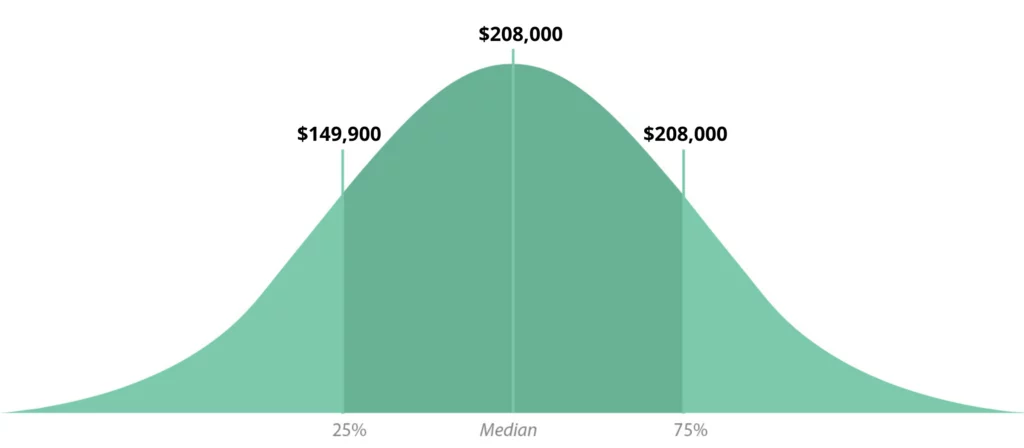
1. Overview: Job Duties, Salary, and Common Requirements
2. A Comprehensive Guide to Becoming a Psychiatrist
3. What Does a Psychiatrist Do?
4. Signs You Should Consider Becoming a Psychiatrist
5. How Do You Become a Psychiatrist?
6. What are the Knowledge and Skills Needed to be a Psychiatrist?
7. Popular Schools and Colleges in the U.S. for Aspiring Psychiatrists
8. How to Get a Job as a Psychiatrist
9. Learn About Geographic and Location Pay Differentials
10. Make Your Resume Stand Out
Psychiatrists made a median salary of $208,000 in 2018. The best-paid 25 percent earned $208,000 that year, while the lowest-paid 25 percent earned $149,900.

Psychiatric Technicians
Addictions Counselors
Pediatricians
Marriage and Family Therapists
Registered Nurses
Genetics Counselor
Special Education Teacher
Communication skills
Critical thinking
Therapy and counseling
Psychology
Biology
Observational skills
With the reported rise of mental health issues in the U.S., psychiatrists are now in demand more than ever. Psychiatrists focus on a patient’s thoughts and emotional state, and the connection between the brain and behavior.
Aspiring psychiatrists should understand the education and clinical requirements they have to go through to start their journey in the psychiatry field. This career guide will direct you on how you will achieve your dream and become successful as a psychiatrist.
Psychiatrists are medical doctors who specialize in psychiatry, a branch of medicine focused on dealing with the assessment, diagnosis, and prevention of mental, behavioral, and emotional disorders.
There are misconceptions about the job responsibilities of a psychiatrist. Psychiatrists do not only treat mentally ill patients or patients with psychiatric disorders; this only a fraction of what a psychiatrist does to help patients.
In the U.S., it is estimated that 16.2 million adults have at least one major depressive episode in a year. Depression is a mental illness that should be taken seriously. It affects how you feel, think, and act in a negative way. It causes a person to feel despair, deeply sad, or even worthless. Symptoms of depression may vary from person to person. This may include:
A phobia is an extreme and unreasonable reaction of fear for an object, situation, person, or activity. According to the National Institute of Mental Health (NIMH), there is an estimated 12.5% of adults in the U.S. who experienced a specific phobia in their lives. People with phobias recognize their fears but are unable to do something about it. The ten most common phobias are:
Everyone experiences stress and anxiety at some point in their lives. It is difficult to spot the difference between these two as they share many of the same symptoms. Stress is your body’s reaction to an external cause–for example, meeting a deadline. Anxiety, on the other hand, is your body’s reaction to the internal origin of stress.
Unhealthy habits are actions we yearn to avoid like smoking, excessive drinking, and stress eating. Addiction, according to the American Psychiatric Association (ACA), is a mental disorder by obsessive use of substances in spite of the harmful effects. People with unhealthy habits and addictions are aware of their problems but have no control over stopping it.
Also called mental illness, a mental disorder is a health condition that affects your behavior, thinking, mood, and feeling. There are numerous causes of mental illness such as a traumatic brain injury, excessive consumption of alcohol, use of recreational drugs, genes and family history, chemical imbalance in the brain, or even infections.
Some telltale signs of a mental disorder include:
Psychiatrists have the skills to treat patients with these conditions and fully understand the relationship between the mind’s ailments and the human body. Psychiatrists diagnose, treat, and prevent the disorders related to mental health. Their job responsibilities include:
Before you enter the field in psychiatry, you must make sure that you really want to be a psychiatrist. Do you genuinely love listening to people’s concerns and do you really care about helping them get through their mental issues? If your answer is no, then psychiatry is not the right career path for you. Here are a few characteristics you should possess if you are interested in becoming a psychiatrist:
You enjoy and feel energized being around people, and you are genuinely interested in hearing their backgrounds and stories. Being a ‘people person’, it is easy for you to get along with others of different personalities and difficult situations. A ‘people person’ has an innate delicate power of persuasion, which helps turn around a situation by just talking a patient through it.
Your friends and family call you their “therapist” because they can tell you their problems and secrets, and even seek your advice on how they can resolve their personal issues. The reason being is because you are a good listener. You are curious about their lives and you are able to interact with them at times when they are emotionally vulnerable.
Patience is an important skill psychiatrists should possess. It is a liberating practice of waiting, observing, and timing in dealing with the progress of a patient. Some people with mental issues are reluctant to the interference of help, and it can be frustrating for the part of a psychiatrist. However, with patience, you are able to take a step back first and analyze the situation, waiting for the right time to make your move. By transforming frustration to patience, you will not be as affected with your patient’s situation by not forcing the outcome.
Some psychiatrists also battle with their own mental health, which becomes their reason why they pursue a career in psychiatry. Their previous experiences have become their driving force as they know what it is like to be in that situation. Often, it is their own therapists that made them realize that they should also become one.

Before you become a psychiatrist, you must obtain a bachelor’s degree from an accredited school. There is no specific degree to be in medical school. However, a good choice would be to take undergraduate courses that focus on physics, chemistry, biology, and calculus to meet the medical school admission requirement. It will help your standing when applying for your medical school admission as well as your major in pre-med or science discipline, and then gain hands-on experience by volunteering in a hospital or clinic.
As part of the medical school requirement, aspiring psychiatrists must submit their MCAT exam scores. Almost all of the medical schools in the United States require their prospective students to have this. It is a computer-based test that assesses critical thinking, problem-solving, knowledge of scientific concepts and principles, and written analysis of students.
It usually takes four to five years to complete medical school programs. An aspiring psychiatrist needs to choose between a Doctor of Medicine (M.D.) or Doctor of Osteopathic Medicine (D.O.) to become a psychiatrist. Each degree is similar in the methods of treatment but different in training philosophy and patient care.
The first two years or so in medical school are a combination of classroom and laboratory. The basic classes in science will focus on anatomy, biochemistry, microbiology, pathology, and pharmacology. In psychiatry, you will expect these courses in your curriculum: behavioral science, psychopathology, and psychiatry clerkship.
The second half of the medical school program will focus on rotations at hospitals and clinics, assisting doctors and other healthcare professionals in a particular specialization like psychiatry, surgery, internal medicine, and pediatrics. The rotations will heavily contribute to your experience and you will have enough practice in a certain specialty.
After finishing medical school, aspiring psychiatrists should enter a residency program, which usually lasts three to eight years. The residency program consists of rigorous training work experience in your choice of specialty under the direction of a licensed psychiatrist.
To become a full-fledged psychiatrist, you must be licensed and board-certified. In the U.S., state licensing standards may vary. Still, all psychiatrists are required to pass the United States Medical Licensing Examination (USMLE) for graduates of M.D. programs, or the Comprehensive Osteopathic Medical Licensing Exam (COMLEX-USA) administered by the National Board of Osteopathic Medical Examiners (NBOME) for graduates of D.O. programs.
After obtaining a license, students may take an examination for board certification. These certifications are offered by the American Board of Medical Specialists (ABMS) and the American Board of Psychiatry and Neurology (ABPN).
Just because you’ve completed your medical school and residency programs, then acquired your license and became certified, does not mean that your education must end. You still have to continue education programs to remain certified. You may refer to the following continuing education programs in psychiatry:
Getting excellent education and training can help you become successful in the psychiatry field. However, you also need to have innate characteristics and skills to be a competent psychiatrist.
This includes speaking, active listening, observing, and empathizing. You are capable of giving clear information and understanding the information you are receiving.
You analyze the facts before coming up with a judgment. This includes identifying the strengths and weaknesses of the solutions and conclusions, understanding the relations between ideas, and analyzing and solving problems systematically.
Also called psychotherapy or talk therapy, therapy and counseling is the process of helping patients with mental illness and emotional complexity. Psychotherapists use principles, methods, and procedures to treat their patients.
According to the American Psychology Association (APA), psychology is the scientific study of the mind and behavior. Psychologists study and understand how the human brain functions, how human behavior works, and what mental processes are.
Specifically, biological psychiatry is the knowledge and understanding of mental disorders and the relationship between brain function and behavior.
According to Oxford’s online dictionary, observation is “the act of watching someone or something carefully for a period of time, especially to learn something.” In psychiatry, observation is the method of studying a patient’s behavior to assess the mental state, preventing the risk of harming themselves and other people so that they can come up with the appropriate medication or treatment.
There are thousands of schools and colleges in the U.S. for psychiatry, but there are some that stand out. Below is a list of the best psychiatry programs in 2019 according to U.S. News:

Psychiatrists work in different kinds of settings. You can find them in their private clinics, military organizations, governmental institutions, schools, psychiatric hospitals, mental health clinics, and nursing homes. With a job outlook of 7%, faster than the average profession, there are many jobs available out there for aspiring licensed and board-certified psychiatrists. Here are some tips on how you can find a job:
Job search engines allow you to find open job positions instantly. Compiled below are the best websites to look for opportunities in the field of psychiatry:
You can build your professional network in psychiatry by joining organizations. This will also help you find a job. You can join the following groups:
You can also find more psychiatry organizations through this link:
http://www.theagapecenter.com/Organizations/Specialties/Psychiatry.htm
Geographic areas often have location pay differentials, making a huge impact on your potential earnings. There are some states that offer a higher salary and some with a lower salary to a psychiatrist.
Here’s a list of the average mean of annual earnings of psychiatrists in every state according to the latest data of Psy.D Programs:
| State | 2018 Mean Annual Wage |
|---|---|
| Hawaii | $269,800 |
| South Dakota | $267,520 |
| Connecticut | $258,200 |
| Maine | $256,270 |
| California | $255,790 |
| New Mexico | $255,410 |
| Illinois | $251,390 |
| Wyoming | $251,070 |
| Minnesota | $250,550 |
| New Jersey | $245,990 |
| Washington | $245,990 |
| Indiana | $243,630 |
| Oregon | $242,020 |
| Arizona | $240,660 |
| Missouri | $240,300 |
| Nebraska | $240,180 |
| Colorado | $234,860 |
| Pennsylvania | $232,990 |
| Georgia | $231,410 |
| South Carolina | $226,120 |
| Kansas | $226,090 |
| Rhode Island | $224,440 |
| Alaska | $222,310 |
| Mississippi | $221,060 |
| Maryland | $215,000 |
| State | 2018 Mean Annual Wage |
|---|---|
| Nevada | $214,980 |
| New Hampshire | $212,710 |
| Michigan | $212,030 |
| Iowa | $211,870 |
| Kentucky | $210,680 |
| New York | $208,750 |
| Texas | $204,480 |
| Virginia | $198,810 |
| North Dakota | $196,410 |
| Tennessee | $195,670 |
| Florida | $195,400 |
| Ohio | $194,700 |
| Massachusetts | $194,220 |
| North Carolina | $189,190 |
| Vermont | $186,400 |
| Wisconsin | $186,200 |
| Oklahoma | $183,930 |
| Delaware | $177,720 |
| Montana | $167,370 |
| West Virginia | $166,400 |
| Alabama | $166,220 |
| Arkansas | $153,920 |
| Utah | $145,700 |
| Idaho | $137,280 |
| Louisiana | $120,090 |
Report from the Psy.D Programs
If you are trying to find a job as a psychiatrist, then a well-polished resume is your first key in helping you land a job. That is why it is crucial that you take time creating your resume to secure the position you are applying for. Here are some ways to make your resume stand out.
A generic resume is unappealing to an employer. It shows that you are the same as other applicants who do not thoughtfully write their resume or worse, they might even think you just sent the resume without reading the job requirements and qualifications. Although it may seem time-consuming, reviewing the job listing of the position and tweaking your resume to meet those requirements will add value to your application and increase your chances of receiving a call from the hiring manager.
Most recruiters do not read the hundreds of applications they are receiving, especially those in a large company. Many of them use a filtering system to scan resumes by targeting specific keywords. These keywords are related to the job–psychiatry, the job description, and the qualifications–so it is important that you check the job posting and take note of the frequently used words.
When submitting your application, just send a one to two-page resume. It should contain your contact information, employment and education history, experiences, achievement, etc. However, it is much better if you also include supporting documents such as:
Take extra time proofreading your resume and checking for any typos, grammar, and spelling mistakes, as well as formatting errors. Recruiters hate these kinds of mistakes because it shows that you have probably done your resume at the last minute. Your resume reflects your personality, and with a poorly proofread resume, they might have an impression of you as an employee that procrastinates and crams when a due date is near.
Being prepared will make your interview process a breeze. You will impress your interviewer and even lock in a job offer. Conducting research on the employer’s background is important because, most likely, it will be included in the interview. The employer will expect that you know about their company and they will most probably ask you for the reason why you want to work for them.
The next step is to prepare your answers to the possible interview questions. Here are some questions the interviewer might ask:
Depression is a common mental disorder in the U.S. The interviewer wants to evaluate you if you treat depression efficiently using your knowledge in the latest psychotherapy and medication approaches. Prepare to give an example from your previous experience and let the interviewer know how you successfully treated the patient.
Anxiety disorder affects 40 million adults in the U.S. and is the most common mental disorder, according to the Anxiety and Depression Association of America. Show the interviewer that you have the essential professionalism, warmth, and empathy to build trust so your patients will become more comfortable working with you. Showcase your familiarity with psychological therapy, medication, and treatments that may limit or prevent their negative thoughts.
There are many factors of why you choose to pursue a career, and you can answer this question in a variety of ways. You can include your interests and personal strengths that make you an excellent psychiatrist and a strong candidate for the job. Be honest in answering this question and show the interviewer your passion to help others.
In order for a patient to take their medication, you first need consent from the patient or the legal guardian. You cannot and should not force a patient to take medication. If in case the patient has no legal guardian and is declared incompetent, then you need to obtain a court order for the treatment to be permissible. Non-compliant patients in psychiatry is one of the greatest challenges of a psychiatrist. The principle here is to ensure the well-being of the patient.
There are various answers to this question, but the common challenge of a psychiatrist is becoming emotionally involved with the treatment of the patient. Sometimes you will have a hard time finding the right diagnosis for your mentally ill patient, or the progress of your patient to your treatment can be really slow. This might cause you frustration or even burnout. Demonstrate to your interviewer your patience in dealing with your patient’s slow progress. You also need to show that you apply healthy detachment, and you emotionally disconnect from the negative situation or behavior of your patient by not reacting to the situation.
Sharpen your skills in psychiatry by taking these top online courses
Skills Success has carefully curated and organized thousands of online video courses. Start your journey to becoming a psychiatrist with these top online courses.






